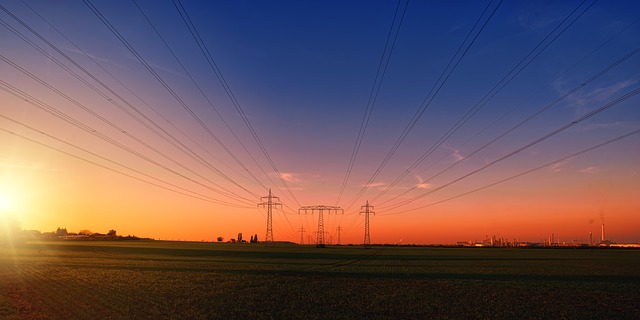Power generation
The term 'power generation' describes the process of generating electrical power. Types of power generation include:
- Fossil fuel thermal energy such as coal or natural gas.
- Biogas energy.
- Geothermal energy.
- Hydroelectricity.
- Wind energy.
- Solar thermal energy.
- Tidal energy.
- Photovoltaics.
- Nuclear energy.
- Chemical energy generated from fuel cells, batteries, and so on.
Power stations are normally located away from centres of population where fossil fuels are abundant or good transport links exist. Many of these locations are well away from the towns and cities where the electricity is used and hence there is a need for electricity transmission and distribution.
The national power supply network is managed by four types of organisation:
- Generators - responsible for producing the electricity.
- Suppliers - responsible for supply and selling electricity to consumers.
- Transmission network - responsible for the transmission of electricity across the country.
- Distributors - those who own and operate the local distribution network from the national transmission network to homes and businesses.
Microgeneration is the local production of power on a very small scale in comparison to the typical output of a power station.
Consumers can qualify for an ‘export tariff’ by selling surplus electricity back to their supplier. Allowable technologies are:
- Solar photovoltaic panels.
- Wind turbines.
- Water turbines.
- Anaerobic digestion (biogas energy).
- Micro combined heat and power (micro-CHP).
NB Net Zero by 2050, A Roadmap for the Global Energy Sector, published by the International Energy Agency in May 2021, suggests that power generation: ‘Refers to fuel use in electricity plants, heat plants and combined heat and power (CHP) plants. Both main activity producer plants and small plants that produce fuel for their own use (auto-producers) are included.’
[edit] Related articles on Designing Buildings
- Arcing.
- Building an electrical grid for our times.
- Dispatchable generation.
- Electricity supply.
- Energy consumption.
- Energy storage.
- Engineering Recommendation G99.
- Fossil fuel.
- Hydroelectricity.
- Micro-grids.
- Microgeneration.
- Oil - a global perspective.
- Power.
- Renewable energy.
- Smart Export Guarantee SEG.
- Solar photovoltaics.
- Substation.
- The future of UK power generation.
- Types of fuel.
- Using P-DfMA to decarbonise coal-fired power stations.
- Watt.
Featured articles and news
Some of the articles relating to water, here to browse. Any missing?
Recognisable characters of Gothic architecture designed to dramatically spout water away from buildings.
A case study and a warning to would-be developers
Creating four dwellings... after half a century of doing this job, why, oh why, is it so difficult?
Reform of the fire engineering profession
Fire Engineers Advisory Panel: Authoritative Statement, reactions and next steps.
Restoration and renewal of the Palace of Westminster
A complex project of cultural significance from full decant to EMI, opportunities and a potential a way forward.
Apprenticeships and the responsibility we share
Perspectives from the CIOB President as National Apprentice Week comes to a close.
The first line of defence against rain, wind and snow.
Building Safety recap January, 2026
What we missed at the end of last year, and at the start of this...
National Apprenticeship Week 2026, 9-15 Feb
Shining a light on the positive impacts for businesses, their apprentices and the wider economy alike.
Applications and benefits of acoustic flooring
From commercial to retail.
From solid to sprung and ribbed to raised.
Strengthening industry collaboration in Hong Kong
Hong Kong Institute of Construction and The Chartered Institute of Building sign Memorandum of Understanding.
A detailed description from the experts at Cornish Lime.
IHBC planning for growth with corporate plan development
Grow with the Institute by volunteering and CP25 consultation.
Connecting ambition and action for designers and specifiers.
Electrical skills gap deepens as apprenticeship starts fall despite surging demand says ECA.
Built environment bodies deepen joint action on EDI
B.E.Inclusive initiative agree next phase of joint equity, diversity and inclusion (EDI) action plan.
Recognising culture as key to sustainable economic growth
Creative UK Provocation paper: Culture as Growth Infrastructure.
























